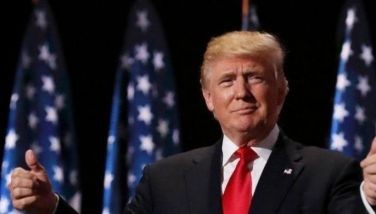Businesses get climate certainty they wanted; now for action
LONDON - With the new global climate deal, businesses around the world got the long-term certainty that they had been clamoring for — now they need to back up the shift to a greener world with cold hard cash.
Many business leaders have praised the climate deal reached Saturday in Paris, saying it will help them steer their companies and the global economy toward a future that limits emissions of the heat-trapping gases that are endangering the planet.
A low-carbon future will take way more than words, though.
The transition from oil and gas to renewables won't be cheap or easy, but after more than 190 countries signed onto the pact, business have a far clearer sense of what types of energy, products and services will be needed over the long-term. Business leaders have long complained that they weren't able to make investment decisions without a clear political message on the greenhouse gas emissions blamed for global warming.
"This agreement provides business with the critical elements which we were calling for to catalyze a clean, thriving economy," said Edward Cameron, policy chief for the "We Mean Business" coalition of organizations working with companies such as Google, Microsoft and Nike to take strong climate action.
The commitments made in Paris — which aim to make sure global warming stays "well below" 2 degrees Celsius (3.6 degrees Fahrenheit) and include pledges to seek to limit the temperature rise to 1.5 degrees Celsius — will, businesses say, help unlock the money needed to make the transition to a low-carbon future.
Some say trillions of dollars could now be unlocked in the transition to clean energy.
"We have an opportunity to build a new economy, and business is poised to help make it happen," said Richard Branson, the Virgin Group chief executive said. "The 'Paris effect' will ensure the economy of the future is driven by clean energy."
Details of how each country will regulate emissions — and even what their specific targets are — must still be worked out. So while businesses have a general idea of how the corporate world will change, they don't yet know how emissions will be penalized and how quickly the changes will be adopted.
"The implementation of a Paris Agreement could prove at least as contentious as the negotiations themselves," declared Kevin Book, Managing Director of ClearView Energy Partners in Washington.
And bond-rating firm Moody's says energy businesses in Europe will continue to be at the mercy of European Union policy — and not the pact itself. It says the Paris Agreement "does not provide detailed objectives relative to greenhouse gas emissions nor does it impose any legal obligation to limit or reduce them."
In order to reach the climate accord's long-term goal, countries agreed to set national targets for reducing greenhouse gas emissions every five years. That could mean shifting how energy is produced and consumed, building different transport systems or changing traditional farming techniques and logging practices.
China, the world's biggest emitter of greenhouse gases, is already the biggest investor in renewable energy technologies, spending at $83.3 billion last year, according to a report by the Frankfurt School and the UN Environment Program. The United States was a distant second at $38.3 billion. Many expect those numbers to continue to grow quickly as both countries limit the use of coal to generate electricity.
The pact appears to be already prompting action. On yesterday, France's business lobby Medef revealed plans by a group of French utilities and other companies to work together on electricity projects in Africa. The idea is to provide electricity to areas currently without power and to do so with "non-carbon" or "low-carbon" energy sources.
Some argue, though, that the agreement's clear long-term climate goal won't be enough to change how the world's economies operate in the short term.
"Despite this weekend's agreement ... we think a continuation of global energy consumption trends seems more likely than a dramatic shift away from fossil fuels," says ClearView's Book.
Although countries like Russia and Saudi Arabia signed the deal, they face the prospect of weaning themselves off the very thing that's made them prosperous — oil and gas. Oil-dependent economies were among the most resistant to early suggestions of including a pledge in the accord to totally "decarbonize" the world economy, and that language was softened in the final text.
In Japan, climate initiatives have lagged in recent years, especially after the country shut down nuclear reactors following the 2011 meltdown at Fukushima. Japan's aging and inefficient power grid has hindered its ability to adapt to the loss of much of its nuclear power generation, as emissions have surged along with costs for imported oil and gas.
In Paris, Japanese negotiators kept a relatively low profile.
"Japan shows striking lack of presence," said a headline in the Mainichi newspaper.
Even businesses that cheered the agreement said they can't do it all by themselves, that governments have to put into action the promises they have made.
Britain's leading business lobby group said the deal reached in Paris represents an "exciting opportunity" for its members but that the British government needs to demonstrate its comment to the goals outlined in the agreement.
"We now have a climate deal agreed by the world's leaders that puts us on a sustainable low-carbon path and which can provide the framework for business to invest with confidence," said Carolyn Fairbairn, director-general of the Confederation of British Industry.
- Latest
- Trending
































